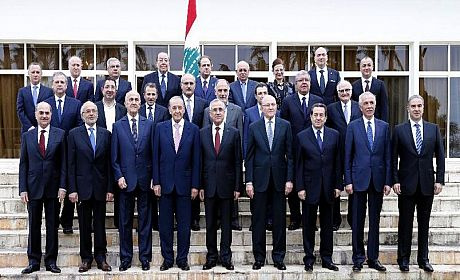Diversity in Tamam Salam’s Cabinet

After 11 months, Tamam Salam finally succeeded in forming a cabinet which is comprised of 24 ministers in the framework of the three existing movements in Lebanon’s political scene (the supporters of the Resistance or the March 8th alliance, the March 14th alliance and al-Mustaqbal, and the group affiliated with the president and of course Walid Jumblatt as the moderate group). There is no doubt that the developments in Syria have had direct impacts on the domestic crisis in Lebanon. In addition to the activities of the two fronts supporting and opposing the Syrian government, ethnic divisions have directly affected the postponement of the establishment of this government. During the past 11 months, great pressure was exerted on Tamam Salam to form his cabinet without the presence of the main Resistance movement but this did not happen. The reason is clear. No movement can deny or ignore the role of the Resistance, and particularly Hezbollah, in Lebanon’s domestic scene of Lebanon. Although Tamam Salam is more inclined towards Saudi Arabia, he knew the scene inside Lebanon well and he understood that his cabinet would be successful if all political factions were present in it, otherwise it would fail.
No cabinet in Lebanon will succeed without the presence of different ethnic and political movements. The recent postponement in Lebanon, at least after the Taif Agreement in 1989 which led to the end of Lebanon’s civil war, shows that reaching an agreement is Lebanon’s destiny. Other solutions do not exist or will be only short-term.
Of course, this matter will not end the internal differences between the movements present in the government. The political viewpoints of the two March 8th and March 14th movements still indicate the fundamental differences between them. Part of these differences is due to the interference of regional parties and international fronts, which is not a new issue. But the other part is internal and is related to the positions and views of each party with regard to important domestic issues including the issue of the Occupation and resistance against the Zionist regime and ultimately economic interactions and people’s livelihoods. It does not seem that there will be an end to these differences. At some junctures, they have been reduced and that was when the meetings called the ‘national dialogues’ were held with the presence of the leaders of ethnic groups and important political groups. These types of meetings could help the reduction of these differences and the establishment of a calm atmosphere. But since the existing groups and ethnicities in Lebanon are generally affected by foreign forces and their positions are set on this basis, the viewpoints of regional and international movements and factions with regard to Lebanon gain importance and this has caused Lebanon’s status in the international scene to be very significant and important despite its small size.
Tamam Salam has stated the objectives of the new cabinet as being the stabilization of the security situation, fighting against terrorism, and providing a proper atmosphere for the election of the new president which is supposed to be held in late May. Following the election of the new president, the head of the new government should basically be chosen or Tamam Salam would again be appointed to form the cabinet. Therefore, some believe that the present government will have a short run but some others believe that, considering the agreed election of the president, the continuation of Tamam Salam’s tenure as the head of the present cabinet could be agreed upon beforehand. The next challenge of Tamam Salam’s cabinet is to write the ministerial statement which has usually created problems for Lebanon. After the formation of any government, the ministerial statement defines the fundamental plans and the road map of the new government. The issue of the Resistance and the maintenance of its arms have, hitherto, been the most important discussion of the political parties inside the government, particularly between the March 8th alliance and supporters of the resistance against Israel and al-Mustaqbal and the March 14th movement. This time, some leaders of the March 14th alliance have stated that they will oppose the maintenance of arms by Hezbollah in southern Lebanon. This challenge could create a crisis for the new government and lead it towards deadlock. Nevertheless, it seems impossible that the domestic disputes with regard to the disarmament of Hezbollah and other resistance forces, especially under conditions when Syria is faced with domestic chaos and when Takfiri and terrorist forces inside Lebanon have become active more than ever before, would end.

